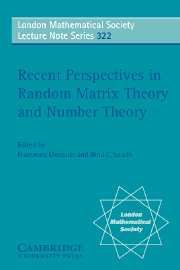Book contents
- Frontmatter
- Contents
- Introduction
- Prime number theory and the Riemann zeta-function
- Introduction to the random matrix theory: Gaussian Unitary Ensemble and beyond
- Notes on pair correlation of zeros and prime numbers
- Notes on eigenvalue distributions for the classical compact groups
- Compound nucleus resonances, random matrices, quantum chaos
- Basic analytic number theory
- Applications of mean value theorems to the theory of the Riemann zeta function
- Families of L-functions and 1-level densities
- L-functions and the characteristic polynomials of random matrices
- Spacing distributions in random matrix ensembles
- Toeplitz determinants, Fisher-Hartwig symbols, and random matrices
- Mock-Gaussian behaviour
- Some specimens of L-functions
- Computational methods and experiments in analytic number theory
- Index
Introduction
Published online by Cambridge University Press: 06 January 2010
- Frontmatter
- Contents
- Introduction
- Prime number theory and the Riemann zeta-function
- Introduction to the random matrix theory: Gaussian Unitary Ensemble and beyond
- Notes on pair correlation of zeros and prime numbers
- Notes on eigenvalue distributions for the classical compact groups
- Compound nucleus resonances, random matrices, quantum chaos
- Basic analytic number theory
- Applications of mean value theorems to the theory of the Riemann zeta function
- Families of L-functions and 1-level densities
- L-functions and the characteristic polynomials of random matrices
- Spacing distributions in random matrix ensembles
- Toeplitz determinants, Fisher-Hartwig symbols, and random matrices
- Mock-Gaussian behaviour
- Some specimens of L-functions
- Computational methods and experiments in analytic number theory
- Index
Summary
This volume of proceedings stems from a school that was part of the programme Random Matrix Approaches in Number Theory, which ran at the Isaac Newton Institute for Mathematical Sciences, Cambridge, from 26 January until 16 July 2004. The purpose of these proceedings is twofold. Firstly, the impressive recent progress in analytic number theory brought about by the introduction of random matrix techniques has created a rapidly developing area of research. As a consequence there is not as yet a textbook on the subject. This volume is intended to fill this gap. There are, of course, well-established texts in both random matrix theory and analytic number theory, but very few of them treat in any length or detail these new applications of random matrix theory. Secondly, this new branch of mathematics is intrinsically multidisciplinary; teaching young researchers in random matrix theory, mathematical physics and number theory mathematical techniques that are not a natural part of their education is essential to introduce a new generation of scientists to this important and rapidly developing field. In writing their contributions to the proceedings, the lecturers kept in mind the diverse backgrounds of the audience to whom this volume is addressed.
The material in the volume includes the basic techniques of random matrix theory and number theory needed to understand the most important achievements in the subject; it also gives a comprehensive survey of recent results where random matrix theory has played a major role in advancing our understanding of open problems in number theory. We hope that the choice of topics will be useful to both the advanced graduate student and to the established researcher.
- Type
- Chapter
- Information
- Publisher: Cambridge University PressPrint publication year: 2005

